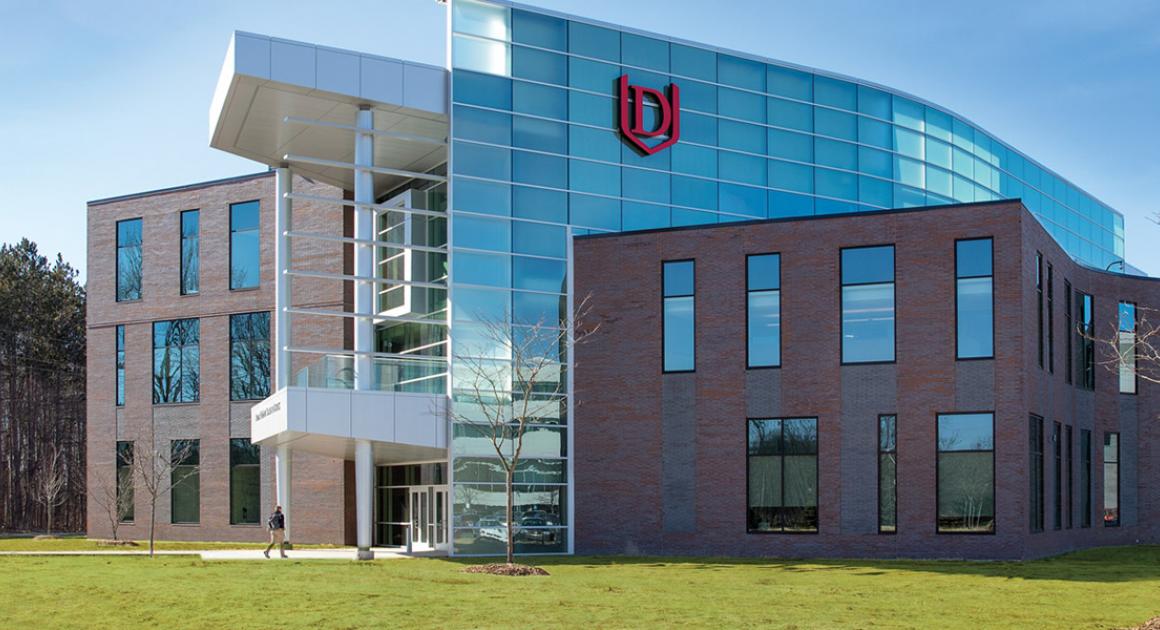Advance your career with our RN to BSN program pathways
Bachelor of Science in Nursing (120 - 122 credits)
Accelerate your way to a bachelor of science in nursing (BSN) — whether you’re just starting your associate degree in nursing (ADN) or you’re already working as a registered nurse (RN) — through the BSN degree program at Davenport University. As one of the region’s best RN to BSN programs, Davenport’s BSN degree will prepare you for nursing roles at Magnet-status hospitals.
Davenport has two pathways to get you there. If you have your ADN and RN, choose our bachelor of science in nursing completion pathway and experience the convenience and quality of one of the region’s best online RN to BSN programs. You’ll receive credit for your ADN and your RN licensure and can take the remaining 31 credits in this online RN to BSN program. Classes are offered through our Global Campus or in-person at our partner colleges.
Our second option, Davenport’s bachelor of science in nursing concurrent pathway, is for you if you’re pursuing an ADN at one of our partnering local community colleges. Through the concurrent pathway, you can earn your BSN degree up to one year sooner by taking Davenport BS in nursing classes at your community college during the semester or over the summer.
No matter which path you choose, you’ll learn from highly credentialed nursing faculty and staff in Davenport’s in-person or online RN to BSN program. You’ll gain evidence-based knowledge in community nursing and leadership, as well as clinical experiences that support your nursing career goals.
What is a bachelor of science in nursing?
A bachelor of science in nursing advances knowledge and qualifications for ADN graduates. It’s also for current RNs who want to complete their BSN degree, a credential health care employers are often seeking. Your BS in nursing can open careers to Magnet-status hospitals, leadership roles and higher salaries, while also preparing you to continue on to a master’s degree in nursing.
Graduates with a bachelor of science in nursing and an RN licensure work in hospitals and clinics, physician private practices, home health care services, community health facilities, nursing care facilities, schools and government agencies.
Explore classes for Davenport’s bachelor of science in nursing
Davenport’s BS in nursing classes, such as nursing leadership and community health nursing, will enhance your skills in critical thinking, assessment, communication, collaboration, applied research, self-directed learning, leadership and management. In addition to the bachelor of science in nursing sequence, Davenport’s RN to BSN program includes a specialty in health and human services case management. Exceptional convenience, classes, instructors and clinical experiences make this one of the region’s best online RN to BSN programs.
Complete your bachelor of science in nursing and continue on to earn your master’s in nursing (MSN) at Davenport. Graduates of our MSN program enjoy a 100% employment rate.
Which class should I take? When should I take it?
See our Recommended Program Sequences:
Why pursue a BSN degree at Davenport University?
Through in-person and online RN to BSN program courses, hands-on community health nursing clinicals and nurse manager and leader clinicals, Davenport’s RN to BSN program prepares you to advance in your nursing career and provide exceptional patient care. If you’re completing your ADN degree at one of our partner colleges, Davenport’s BS in nursing concurrent pathway is excellent preparation for your nursing career.
Experience the Davenport difference:
| |
Real-world expertsLearn from highly credentialed and experienced faculty who hold MSN, PhD and other advanced degrees and credentials. They also bring a wide variety of real-world nursing experience to you. |
| |
Hands-on experienceGain direct-care clinical experience within leadership/management and community nursing and receive one-on-one mentoring through a nursing preceptorship in an acute-care setting. |
| |
CCNE accreditationEarn a BSN degree in an RN to BSN program accredited by the Commission on Collegiate Nursing Education (CCNE), the gold standard for quality and a factor for graduate school admittance. |
| |
Transferable creditsGet 60 transfer credits in the RN to BSN program for your associate degree in nursing and 30 credits for your RN licensure. That’s just one reason we’re among the best online RN to BSN programs. |
| |
Nursing career preparationEarn the BS in nursing employers want: According to the American Association of Colleges of Nursing, 77.4% of employers are expressing a strong preference for BSN degree program graduates. |
 |
Networking opportunitiesJoin our Student Nurses Association, participate in nursing events held on campuses associated with our in-person or online RN to BSN program and apply for Sigma Theta Tau nursing honor society. |
Get started on your bachelor of science in nursing degree
Explore the admissions requirements and then take the next step toward earning your BSN degree at Davenport.
Talk to an admissions advisor
Davenport’s admissions team is here to answer your questions. Please call us at 800.686.1600 or email us at info@davenport.edu.
Apply now or request more information
Start on the road to a more rewarding nursing career with our BSN degree. Request more information or begin your application now.
Programs related to the bachelor of science in nursing degree
Additional resources
Preadmission Requirements
- Must possess a current active unencumbered and unrestricted Registered Nurse License
- Must have at least a cumulative G.P.A. of 2.5 from previous nursing program
Admission Requirements
- Must be currently licensed as a Registered Nurse (RN) or be completed with NCLEX exam by the end of the first semester.
- Associate degree or diploma as a Registered Nurse. (RN)
- Official transcripts from previous nursing program.
- Cumulative GPA of at least 2.5 from previous nursing program.
- Criminal Background Check and Drug Screen Policy
- Complete Nursing Application
- One professional recommendation
Preadmission Requirements
- Must have at least a cumulative G.P.A. of 3.0 from current community college nursing program
Admission Requirements
- Official transcripts from current community college nursing program
- Cumulative GPA of at least 3.0 from current community college nursing program
- Community college nursing program acceptance letter
- Criminal Background Check and Drug Screen Policy
- Complete Nursing Application
- One professional recommendation
Bachelor of Science in Nursing - Concurrent Pathway
This pathway is a unique partnership with local community colleges. It allows students to concurrently take Davenport BSN courses while enrolled at their local community college. This partnership gives students the chance to complete the BSN in as little as two semesters after graduating from the ADN program. As an added convenience, the courses required for Davenport’s BSN program are taught locally at the community college.
(BSN Concurrent Application is only for Community College Partnerships.)
BSN Concurrent (Associate Degree in nursing accepted with advanced standing per community college partnerships)
Faculty and Staff
Program Director: Aleta Pillai, PhD, MSN, RN
Department Chair: Tracy Alberta, MSN, RN
1. Care Delivery: Integrates clinical judgment and evidence to develop, implement and evaluate person-centered plans of care for clients in diverse populations encompassing individuals, families, and communities across the lifespan.
2. Care Coordination: Manages nursing care of individuals, families, and communities, through coordination of resources and in collaboration with the interprofessional healthcare team, to promote safe, high-quality care and equitable outcomes.
3. Professionalism: Displays a commitment to the current standards of professional nursing practice according to the American Nurses Association.
4. Quality Management: Applies knowledge of information technology, leadership behaviors, and systems-based thinking to ensure quality and safety in complex healthcare systems.
5. Health Management: Promotes equitable health outcomes for diverse populations through assessment of risks, evidence-based prevention strategies, coordination of resources, and policy development.
6. Personal Development: Utilizes self-reflection and self-advocacy to promote personal well-being and resilience.
The formation of nursing professionals is based on a conceptual model that includes five over-arching concepts: the human person, nursing, health, environment/society, and the teaching/learning process.
Human Person
Human beings are unique, adaptable, and possess inherent dignity, thus worthy of caring, nurturing, and respect. Human beings exist in highly valued reciprocal relationships with others.
Environment/Society
Human beings exist within a dynamic physical, social, and cultural environment. The environment impacts the health of individuals, groups, and populations and as such, is a relevant consideration for the nurse.
Health
Health is individually defined by the distinctive perspective of each human person or group, based on unique goals for optimizing quality of life, mental health, and functional status. Health is a dynamic state, continually changing, and all can improve health as it is individually defined by each person.
Nursing
Nursing is a caring profession that embraces a holistic approach to healthcare, in fully recognizing the interconnectedness of biological, psychological, social, cultural, and spiritual factors that contribute to health. Nurses are autonomous healthcare providers, accountable for their practice as determined by academic preparation, licensure, and certification. Nursing has its own scientific body of knowledge built from a foundation of biological and social sciences and adheres to a code of ethical behavior.
Teaching/Learning
Teaching and learning is a collaborative interaction between teacher and learner, with mutual accountability for active engagement, respectful communication, and constructive problem-solving. The faculty recognize that learners, as human persons, are unique and present with a variety of learning styles, developmental stages, and life experiences that create individual states of readiness for transformational learning. Learning is active, builds on prior knowledge, requires intrinsic motivation, and leads to a measurable change in knowledge, behavior, and nursing clinical judgment. Faculty engage in evidence-based pedagogies and provide an equitable and inclusive learning environment for all.
| Associate Degree in Nursing | NCLEX-RN Licensure Exam passed | Davenport University Credits | BSN Completion Degree at DU |
| 60 credits | 30 credits | 31 credits | 121 credits |
Some programs require a student to complete a portion of their degree plan off-campus.
View a full list of those programs and courses
*Coursework is online with on-site clinicals
Source:
U.S. Dept. of Labor

